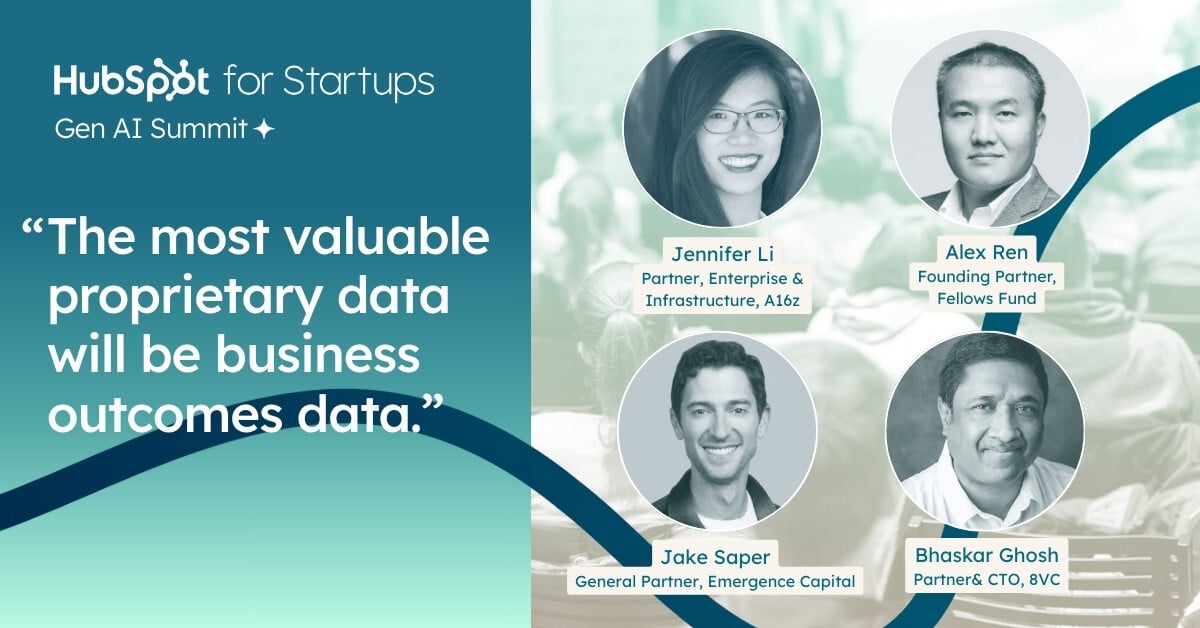Balancing Hype with Real-World Impact: VCs Share Their AI Investment Strategies
Top VCs from Emergence Capital, 8VC, A16z, and Fellows Fund share AI investment strategies, founder profiles, and market opportunities at Gen AI Summit.

Top VCs from Emergence Capital, 8VC, A16z, and Fellows Fund share AI investment strategies, founder profiles, and market opportunities at Gen AI Summit.

At HubSpot for Startups' annual Gen AI Summit in San Francisco, four prominent venture capital partners came together to discuss the evolving landscape of AI investing. The panel featured Jake Saper from Emergence Capital, Bhaskar Ghosh from 8VC, Jennifer Li from Andreessen Horowitz, and Alex Ren from Fellows Fund, with Charles Elkan (CEO of Thick.ai and former Global Head of Machine Learning at Goldman Sachs) moderating the discussion.
The panelists outlined their distinct approaches to AI investing, revealing how different funds are positioning themselves in this rapidly evolving market.
Emergence Capital takes a B2B-focused approach, concentrating on how AI can augment workers rather than replace them. Jake Saper emphasized their interest in integrating AI into applications that help workers perform more effectively, citing Zoom's Sales IQ product as an example of AI-powered real-time coaching.
8VC casts a wider net with investments spanning from biotech to logistics, where AI appears as automation mechanisms. Bhaskar Ghosh noted their particular focus on infrastructure and platforms, including data and AI plumbing, middleware, and departmental applications accelerated by foundation models.
Andreessen Horowitz concentrates on early-stage B2B enterprise and infrastructure investments that enable developers to build intelligent workflows. Jennifer Li highlighted their broad approach across biotech, gaming, and consumer experiences, with investments ranging from vector databases to foundation models.
Fellows Fund brings a unique model with 25 fellows who are industry leaders at top tech companies. Alex Ren explained their strategy of seeking the best AI company from each vertical, including accounting, insurance, healthcare, and enterprise sectors.
With many companies building on readily available APIs like OpenAI, the question of defensibility becomes crucial for both founders and investors.
Key strategies for creating sustainable competitive advantages include:
Jake Saper emphasized using Clayton Christensen's "jobs to be done" framework, noting that if most of a job can be accomplished by going directly to ChatGPT, the startup likely lacks defensibility. The key is building comprehensive solutions that require much more than just the model.
The panelists revealed a significant shift in thinking about proprietary data requirements for AI startups.
The Four-Year Evolution: Jake Saper noted how his perspective has changed dramatically, explaining that four years ago, he wouldn't have believed general models could pass the bar exam or obtain medical licenses. Today's general models are so capable that startups don't necessarily need extensive proprietary data upfront.
Practical approaches for startups include:
Jennifer Li provided a compelling example of a company focused solely on texture generation for game design and product photography, demonstrating how startups can succeed by being highly purposeful with their data strategy.
The panelists largely viewed increasing regulation and compliance requirements as positive developments for the AI industry.
Why regulation benefits the ecosystem:
Bhaskar Ghosh outlined specific B2B compliance challenges that represent opportunities for startups, including industrial privacy concerns, copyright compliance in model training, and data-as-a-service legal frameworks. Jake Saper warned that without proper guardrails, a major incident could cause enterprises to stop purchasing AI solutions entirely.
While much AI focus centers on knowledge work, the panelists discussed opportunities in physical sectors like construction, manufacturing, and logistics.
Current applications showing promise:
However, Alex Ren noted that language model innovations remain primarily text-focused, making immediate applications in physical industries more challenging compared to content generation and enterprise applications where startups are already profitable.
Addressing whether AI-powered content generation creates real productivity gains versus zero-sum competition, the panelists emphasized that AI enables people to accomplish tasks they previously couldn't perform.
Alex Ren shared a personal example of creating a beautiful poster in three minutes using AI tools, a task that would have previously required hiring a designer for several days. This democratization of capabilities—enabling non-experts to produce professional-quality work—represents genuine productivity enhancement rather than mere competitive redistribution.
The ideal founder profile for AI startups differs significantly between application and infrastructure companies.
Essential founder qualities:
For application companies: Domain expertise trumps AI expertise, with founders who understand user personas and workflows having significant advantages.
For infrastructure companies: Deep technical AI background becomes essential, particularly for founders tackling foundation model operations and AI lifecycle management.
Alex Ren emphasized that while there are hundreds of thousands of AI engineers, only a few hundred people can truly build viral businesses, making product market fit and go-to-market execution the primary differentiators.
The panel concluded with the insight that in a world where anyone can build something with OpenAI over a weekend, founders solving problems they've personally experienced maintain an unfair advantage in an increasingly crowded market.
AI Disclaimer: The insights shared in this video or audio were initially distilled through advanced AI summarization technologies, with subsequent refinements made by the writer and our editorial team to ensure clarity and veracity.
